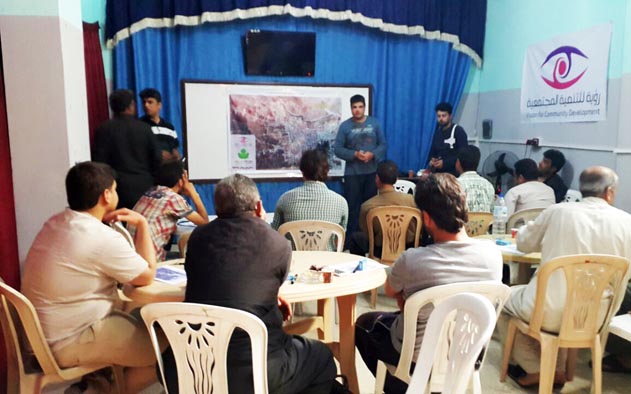A New Census for Kfar Nabel

A new census is underway in the city of Kfar Nabel with the aim of improving the delivery of aid and public services.
The project, named Bayan wa Amana (Data and Integrity), is supervised by the local council and the Royah Centre for Social Development and is expected to take three months.
“The last census conducted in Kfar Nabel was carried out by the Union of Revolutionary Bureaus four years ago,” said local council head Ayman Kleido.
“The statistical data they gathered is outdated and many demographic changes have taken place, which is why we launched the project. Our new census will cover the local population as well as the internally displaced who took refuge in our city,” he said.
The project is supported by the Badael organisation, which had initially planned to fund an initiative to strengthen trust between the public and the local council.
“We managed to persuade executives at Badael to redirect the funds towards a census project,” said Mahmoud al-Khatib, head of external relations at the local council.
“We thought this project would serve us better, as it would allow us to build an accurate database to rely on when identifying the needs of Kfar Nabel’s residents. This will ensure the timely and accurate delivery of public services,” he said.
Al-Khatib said that Kfar Nabel’s council had been repeatedly excluded from participating in relief projects planned by aid organisations that operate in liberated areas. Many other local councils found themselves in a similar position, he said.
“They claim that we do not employ qualified staff, and that we don’t have accurate information or records upon which they can base their strategic decisions,” al-Khatib explained.
“Kfar Nabel’s local council is therefore working hard on building a credible reputation, through proving it is an institute that can be trusted,” he said.
The census is being carried out by 12 researchers who were selected from 80 applicants. The council divided the city into 12 areas, and each researcher was assigned one location to cover.
“We adopted an electronic system instead of paper-based questionnaires to save time and effort,” said project coordinator Abdul Razaq al-Humoud.
“All field staff have an application on their mobile phones where they input the information they gather from residents. They then send this information to our our project administration team on a daily basis,” he said.
All project staff participated in a four-day training course, during which they learnt how to use the electronic system and carry out basic field work.
The project’s overall progress is supervised by seven administrators from the local council and the Royah centre. Their tasks include finance and procurement, updating the electronic questionnaires and responding to researchers’ queries.
So far, 85 per cent of the Bayan wa Amana census has been completed.
Project coordinators such as al-Humoud are responsible for writing financial reports for donors and supervising the work of field staff.
“Sometimes they run into difficulties, such as not finding people at home, which means they have to visit the same house several times to gather the information,” he said.
“Lack of cooperation is another problem. Some people don’t trust the local council, while others are scared of getting in trouble with the regime,.”
Nevertheless, field researcher named Abu Mahmoud said that he was thoroughly enjoying his work.
“In the beginning, I saw the job purely as a source of income. But two days into the job, I began to really enjoy it. My role allows me to meet the people of my city in their own homes.
“I can’t even begin to count the number of cups of coffee I have been offered by them. I think I roughly drink about 20 coffees a day. I never feel tired, even when I have to visit the same household several times,” he said.
Abu Mahmoud said that the project was local council’s best enterprise so far and would have a positive outcome on its future work

.
Kfar Nabel resident, 63 year-old Abu al-Abd, agreed.
“Although I have never benefited from the council in any way, I’d like to extend my thanks to its members for their hard work, and their enthusiatic efforts to ensure the delivery of public services to the residents of the city,” he said.
However another resident, 55 year-old Umm Ammar, disagreed. The teacher refused to give out her information and accused the local council’s members of launching projects for their own profit at the expense of the general public.
“During the past five years we have not received a single aid basket from the local council, which means that they are thieves. They have even claimed that we are rich and do not need aid. I refuse to cooperate with them,” she said.
Mostafa al-Jalal is the pseudonym of a Damascus Bureau contributor from Kfar Nabel, Syria.
Read the Arabic version of this article here
